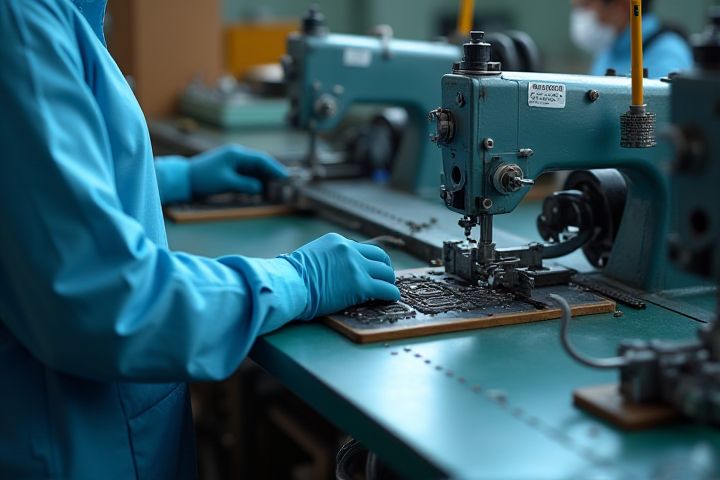
Manufacturing in Nigeria plays a crucial role in the nation's economic development, contributing approximately 10% to its GDP. The sector encompasses various industries, including food and beverage, textiles, chemicals, and machinery, driving job creation and technological advancement. Furthermore, the Nigerian government has implemented policies to encourage investment, modernize production facilities, and improve infrastructure, such as roads and power supply. With a growing population of over 200 million people, the demand for manufactured goods continues to rise, presenting significant opportunities for local and foreign investors. Engaging in manufacturing in Nigeria can lead to sustainable growth and diversification, essential for reducing dependency on oil exports.
Diverse industry sectors
Manufacturing in Nigeria encompasses various industry sectors, including textiles, food processing, electronics, and automotive production. The Nigerian textile industry, rich in cultural heritage, contributes significantly to job creation and economic growth. In food processing, innovations in agribusiness are enhancing efficiency and sustainability, catering to both domestic and international markets. The burgeoning automotive sector is attracting foreign investment, resulting in the establishment of assembly plants and fostering local supply chain development.
Government incentives
Manufacturing in Nigeria is significantly influenced by government incentives designed to stimulate economic growth and attract foreign investment. These incentives include tax breaks, grants, and subsidies aimed at fostering local production and reducing dependence on imports. In regions such as Lagos and Kano, manufacturers benefit from improved infrastructure and access to technology, enhancing their operational efficiency. As a stakeholder, you can explore these government programs, which are essential for building a competitive manufacturing landscape within the country.
Infrastructure challenges
Nigeria's manufacturing sector faces significant infrastructure challenges that hinder productivity and growth. Inadequate power supply remains a critical issue, forcing manufacturers to rely heavily on expensive generators, thereby increasing operational costs. Furthermore, poor road networks and insufficient logistics contribute to delays in the transportation of goods, resulting in loss of revenue and market competitiveness. Addressing these infrastructure gaps is essential for boosting your business efficiency and fostering economic development in Nigeria's manufacturing landscape.
Dependency on imports
Manufacturing in Nigeria is heavily characterized by its dependency on imports, which stifles local production capabilities and innovation. A significant portion of raw materials, machinery, and finished goods are sourced from foreign markets, leading to increased costs and economic vulnerability. The reliance on imported products not only burdens the local economy but also limits opportunities for small and medium-sized enterprises (SMEs) to thrive. By fostering local production and reducing import dependencies, Nigeria could enhance its manufacturing sector, promote job creation, and achieve sustainable economic growth.
Labor availability
Manufacturing in Nigeria heavily leverages the abundant labor force, which is characterized by a youthful demographic eager for employment opportunities. The nation's workforce, with its strong potential for skill development, plays a crucial role in supporting various manufacturing sectors, including textiles, food processing, and automotive assembly. While labor availability presents a significant advantage, manufacturers also face challenges such as fluctuating energy costs and infrastructural deficits. Investing in training programs can enhance productivity and equip workers with the necessary skills to meet global standards in manufacturing practices.
Skill gaps
Manufacturing in Nigeria faces significant challenges due to skill gaps that hinder productivity and competitiveness in the global market. As industries such as textiles, food processing, and electronics expand, the demand for skilled labor increases, highlighting the urgent need for vocational training and education initiatives. Efforts to bridge these skill gaps involve partnerships between government, educational institutions, and private sector companies, fostering a workforce equipped with relevant technical expertise. By investing in skill development, Nigeria can enhance its manufacturing output, attract foreign investment, and create job opportunities for its growing population.
Market access
Manufacturing in Nigeria is driven by essential market access that enables companies to connect with both local and international consumers. The Nigerian market, characterized by a diverse population and increasing demand for goods, offers significant opportunities for both large-scale manufacturers and small businesses. Strategic investment in infrastructure, such as transportation and logistics, is crucial for improving distribution channels and reducing costs. As a manufacturer, leveraging government initiatives and policies aimed at fostering industrial growth can enhance your competitive advantage in this vibrant sector.
Energy supply issues
Manufacturing in Nigeria grapples with significant energy supply challenges that hinder productivity and growth. The country's reliance on inconsistent power sources results in frequent outages, forcing manufacturers to invest heavily in alternative energy solutions such as generators, which increase operational costs. The government's efforts to improve the national grid through renewable energy initiatives and infrastructure development are critical to enhancing the manufacturing sector's efficiency. By addressing energy supply issues, Nigeria can unlock its manufacturing potential, boost exports, and attract foreign investment.
Regulatory environment
The regulatory environment in Nigeria significantly impacts the manufacturing sector, shaping compliance standards and operational efficiencies. Stricter regulations are being implemented to enhance product safety, environmental sustainability, and labor rights, encouraging manufacturers to adopt more responsible practices. In response to these regulations, many businesses are investing in technology and training to ensure compliance while remaining competitive. Your understanding of these regulatory requirements can aid in navigating the complexities of the Nigerian market and optimizing production processes.
Technological advancement
Manufacturing in Nigeria is increasingly centered around technological advancement, with a shift towards automation and digital tools improving production efficiency. Companies are adopting smart manufacturing practices, such as Internet of Things (IoT) integration and advanced robotics, to enhance operational capabilities. This technological focus aims to boost local production, reduce dependency on imports, and foster economic growth. By leveraging innovation, manufacturers in Nigeria are not only optimizing processes but also creating new job opportunities and improving product quality.
